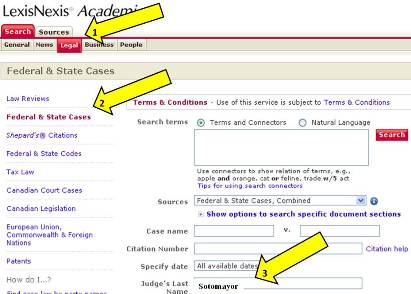The Supreme Court is in the news: On May 26th President Obama nominated Sonia Sotomayor, a federal appellate court judge (U. S. Court of Appeals for the Second Circuit), to replace retiring Justice David Souter.
Curious about how this process works? After all, Supreme Court justices are appointed for life, not just for a President’s term. Here are places for more info:
- Search CQ Electronic Library for “supreme court” and nomination, and the results list will show items such as “History of appointments: The Senate’s role” (from Guide to Congress, 6th ed.). To see the newest results first, click the down arrow under “Date” and find items such as the CQ Weekly article “Supreme Court Nominees Are Presented, Not Just Announced”.

- Search the Library Catalog for keywords (judges or “supreme court”) and selection to find books such as Pursuit of justices: Presidential politics and the selection of Supreme Court nominees (3rd-Floor Main Collection, KF8742 .Y35 1999) and Advice and consent: The politics of judicial appointments (3rd-Floor Main Collection, KF8776 .E67 2005). This catalog search also finds government publications, such as Congressional confirmation hearings of previous nominees to the Court: Confirmation hearing on the nomination of Samuel A. Alito, Jr. (2nd-floor Federal Documents, Y 4.J 89/2:S.HRG.109-277).
- A more recent title, available to UWW students and faculty from other UW libraries by using the free Universal Borrowing service, is The next Justice: Repairing the Supreme Court appointments process (2007).
- Search Oxford Reference Online to find information about the Court, the nomination process, and a listing of “Nominations and Succession of the Justices” from sources such as The Oxford Companion to the Supreme Court of the United States.

You can read Sotomayor’s decisions also, using the LexisNexis Academic database: Select the Legal portion of the database, then on the left select “Federal & State Cases” and then search for her as a judge:


The University Library is a federal depository with many federal, state, local, and international documents on a variety of current and relevant issues available to you in print, microfiche, CD-ROM, and electronically. Come check out your government at the University Library!
